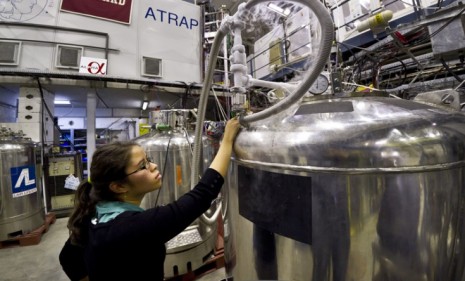The Big Bang machine's 'incredible' antimatter trap
Scientists have managed to temporarily capture mysterious, elusive antimatter, putting them one step closer to solving one of the great mysteries of our universe

A free daily email with the biggest news stories of the day – and the best features from TheWeek.com
You are now subscribed
Your newsletter sign-up was successful
Scientists at CERN, the European lab for particle physics, are celebrating an "incredible" success: trapping antimatter atoms for nearly 17 minutes. That's a major step in our quest to better understand the history and invisible workings of our universe. Here, a guide to the research:
First things first: What is antimatter?
The subatomic particles — protons, neutrons, and electrons — that make up all the matter around us have, or had, corresponding particles with the same mass but the opposite electric charge. That's antimatter.
The Week
Escape your echo chamber. Get the facts behind the news, plus analysis from multiple perspectives.

Sign up for The Week's Free Newsletters
From our morning news briefing to a weekly Good News Newsletter, get the best of The Week delivered directly to your inbox.
From our morning news briefing to a weekly Good News Newsletter, get the best of The Week delivered directly to your inbox.
So where is all this antimatter?
When antimatter and matter meet, both get annihilated, releasing energy in the process. "The laws of physics do not differentiate between matter and antimatter," says Alok Jha in The Guardian, so the Big Bang should have created equal amounts of both matter and antimatter in the universe. But our observable world is mostly made up of matter, not antimatter. So what happened to all the antimatter? That's one of the biggest questions physicists are trying to answer. And it's not easy, because though scientists can create antimatter, as soon as it comes into contact with matter, it's destroyed. So "scientists have never had much of it to play around with," says Jha.
What did the physicists at CERN do?
As they explain in the latest issue of Nature Physics, the scientists working on the ALPHA antimatter experiment at CERN used very strong superconducting magnets to trap 112 atoms of antihydrogen for various amounts of time, up to 1,000 seconds (or 16 minutes and 40 seconds). "That's roughly 16 minutes and 40 seconds longer than the first attempt roughly a year ago, which only managed to snag antihydrogen for a trifling 172 milliseconds," says Matt Peckham at TIME.
A free daily email with the biggest news stories of the day – and the best features from TheWeek.com
So what will this teach us?
This is "one of those physics announcements that may or may not prove important when we figure out the ultimate nature of the universe," says Alexis Madrigal in The Atlantic. But the hope is that, given "that length of time to study the antihydrogen they'd created, the physicists may be able to coax some of the secrets out of the anti-atoms." And the scientists will now be able to make "detailed comparisons of how ordinary atoms of matter compare with their exotic antimatter counterparts," says John Matson at Scientific American.
What's next?
The researchers hope that by "shining microwave and laser light on to the atoms and looking at the differences between antihydrogen and normal hydrogen," they will be able to see "whether the two atoms are as identical as physics theories imply, or whether the theories themselves need to be tweaked," says Jha in The Guardian. "These are still very difficult experiments, and they will take long and hard work, but this new result is a very important step," says Professor Makoto Fujiwara, as quoted by the Daily Mail.
Sources: Atlantic, Daily Mail, Guardian, Scientific American, TIME
-
 How Democrats are turning DOJ lemons into partisan lemonade
How Democrats are turning DOJ lemons into partisan lemonadeTODAY’S BIG QUESTION As the Trump administration continues to try — and fail — at indicting its political enemies, Democratic lawmakers have begun seizing the moment for themselves
-
 ICE’s new targets post-Minnesota retreat
ICE’s new targets post-Minnesota retreatIn the Spotlight Several cities are reportedly on ICE’s list for immigration crackdowns
-
 ‘Those rights don’t exist to protect criminals’
‘Those rights don’t exist to protect criminals’Instant Opinion Opinion, comment and editorials of the day